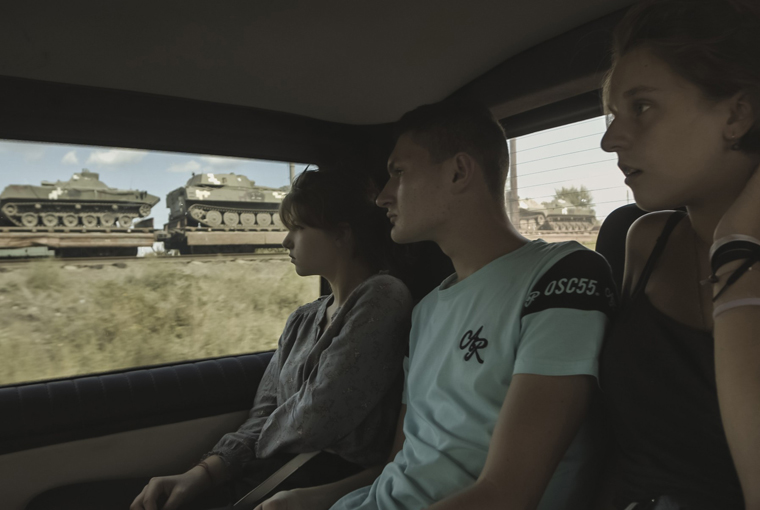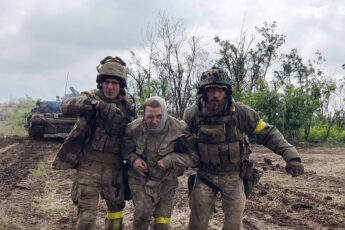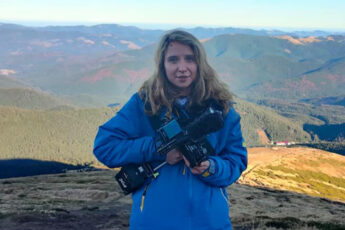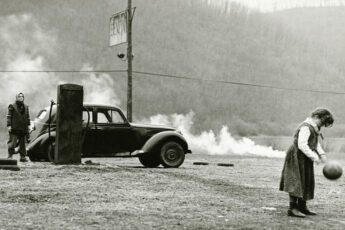Anthem for Doomed Youth
Alisa Kovalenko’s We Will Not Fade Away (My ne zgasnemo, 2023)
Vol. 132 (February 2023) by Zoe Aiano
The documentary We Will Not Fade Away begins by introducing a range of teenagers in Donbas on the cusp of adulthood, raising the question of what lies ahead of them. Of course, given the events that have taken place in Ukraine since shooting first began in 2019, we already know the answer, creating a particularly devastating layer of dramatic irony.
Nevertheless, the band of protagonists are compelling enough to draw attention back to their present, as they each contemplate their imminent future. While at first it can be a bit difficult to keep track of all the different characters, what emerges clearly is the wealth of creativity and aspiration that links them all, which is strongly juxtaposed against the actual opportunities awaiting them.
Some of the barriers facing them are typical of a struggling industrial region, where the primary employment opportunity is represented by the mine. In one particularly intense scene a boy spends a day down the pits with his father, who laughs at his horrified reaction to the working conditions and warns him that this is the fate waiting for him unless he comes up with another plan. Meanwhile, the girls are clearly grappling with patriarchal norms, with one complaining that her art teacher told them that finding a husband is more important than creativity, only for her mother to agree with the bizarre advice that a woman can help her husband achieve anything, even to become president, without for a second considering the idea that a woman could lead in her own right.
Between their various talents and interests, which range from photography and rap to motor repair and acting, they are all equally convinced that the only option for them is to leave. Tragically, one boy predicts to his brother that there’ll be nothing left in 50 years. The specter of the war is everywhere, with the landscape strewn with bombed out buildings and unexploded missiles. There is also a shocking difference between the older kids, who are clearly scared by the sound of gunfire and shelling, and the younger ones, for whom it apparently seems like a totally normal part of life.
Alongside the specificities of growing up in a war zone, however, the universality of coming of age is also very present. In particular, the kids are shown to be enmeshed in numerous care-giving relationships within their families and community, endearingly poised at the precise moment of taking on responsibility while still often being overwhelmed and daunted by it. Continuing this tender bridging of adulthood-childhood, director Alisa Kovalenko’s camera is clearly embedded in their world and a part of their gang. It’s there at the lake lounging around on a lazy summer day and it’s there when some of the boys are stripping telephone wires and have to run for cover at the sound of shelling. The perspective feels very much from within, without any patronizing or preconceived agenda being imposed, simply allowing the kids the space to be themselves.
This dreamy yet bitter-sweet ambience is interrupted at a late stage in the film somewhat brusquely by the out-of-the-blue prospect of a trip to the Himalayas, organized by Ukrainian explorer Valentin Sherbachov. It then isn’t immediately apparent whether they’re applying for it or have already been selected, or even if this is some kind of hoax destined to disappoint them. Gradually it becomes apparent that they have indeed been chosen as the participants – and this is in fact why they were chosen as the protagonists of the film – and the journey is very much real, logistics permitting.
This unexpected redirection of the narrative is initially rather jarring, as we are already invested in the youths’ lives in and of themselves, and it feels like a forced and unnecessary gimmick. Moreover, the performative tough-guy mode that the members of the group all enter into as part of the buildup makes them seem more generic than in the previous scenes. Nevertheless, even more unexpectedly, the trip really goes ahead and they really make it to the Himalayas, and when they do it is actually very poignant. We see the kids come into their own and prove themselves as adults, but most significantly we see their worldview shift as they come to grasp the full extent of the universe outside of Donbas and the possibilities that entails, all of which makes the arrival of the invasion all the more heart-breaking.
It’s futile to state how awful the context of the film is, and how unfortunate it is for the filmmaker to have her work irremediably re-contextualized. The film is strong and engaging on its own merits, beyond its relevance to current events, and deserves to be considered as such. Although it is now destined to live on as a testament of the final days of a time and place, it is also a document of Ukrainian determination and tenacity, which is hopefully how it will be remembered in the long-term.




Leave a Comment